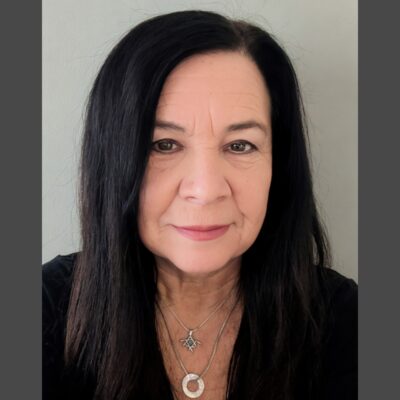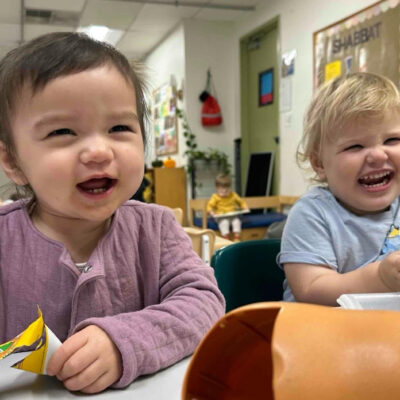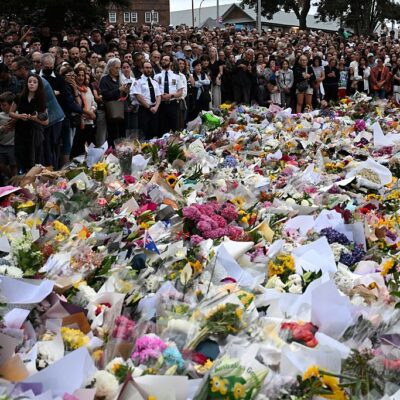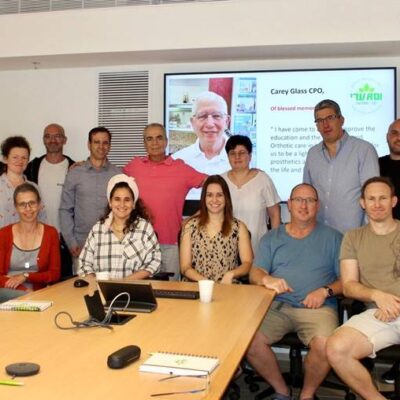With deep philanthropic roots, Jonah Platt launches new podcast on ‘Being Jewish’
The Platt-Beren family has deep roots in the Jewish philanthropy world, so it was natural that actor, writer and singer Jonah Platt, one of five of the Platt children, three of whom are involved in the entertainment business, would follow in his family’s footsteps.
He grew up watching his grandparents, aunts, uncles, and — especially — mother, Julie, volunteering whenever they were called.
“It was ubiquitous,” Platt told eJewishPhilanthropy.
Platt’s grandfather, Robert Beren, held roles at federations and congregations and has buildings named after him at day schools and universities. Platt’s aunts and uncles served in Jewish leadership roles. His mom is currently the chair of the board of trustees of the Jewish Federations of North America, only the second woman to ever fill that role.
“It’s just something that was around us always,” he said. “You support Jewish initiatives.”
Over the past year, Jonah Platt has pivoted his career, focusing less time on his acting and entertainment work and more on advocacy, becoming a sought-out voice in the Jewish world, using his social media to educate followers about Israel.
On Oct. 1, he is releasing the first three episodes of a weekly podcast, “Being Jewish with Jonah Platt,” which will explore what it means to be Jewish, featuring Jewish and non-Jewish guests from the entertainment, journalism, religious, business, food, political and sports worlds.
Platt said that the podcast is not meant to be an educational program, and while many guests are not outwardly politicians, others are, including Rep. Richie Torres (D-NY) and the Hernandez siblings from Arizona. Political commentators Meghan McCain and Van Jones are appearing. “I’m utilizing my own network in a way I never have before,” he said. He is also drawing from the celebrity and influencer community, including appearances by Skylar Ashton and Montana Tucker. Many of his guests are involved in Israel advocacy.
And yet, the reliance on celebrities and influencers for information about current events — instead of historians, political scientists and other experts — comes with potential drawbacks, according to Mark Harvey, associate professor and director of Graduate Business Programs at the University of Saint Mary in Kansas and the author of Celebrity Influence: Politics, Persuasion, and Issue-Based Advocacy. Celebrities can be seen as more authentic, and therefore more credible, than experts, especially in minority communities yearning for representation, despite not having the knowledge and understanding needed to properly educate people.
Because of “the nature of the way that we distribute information now, through social media and through the internet, the people who are going to break through are the people who are more famous,” Harvey told eJP. “There’s nothing wrong with celebrities expressing their opinion. Granted, they have a bigger megaphone than everybody else, but they also have the same right as all the rest of us to say whatever they want to say.”
Using celebrities to spread a message of love for Jews makes sense, Platt said, because they have a “ripple effect.” The larger the platform the bigger the impact. “That’s just the truth of the world we live in today,” he said. “People look to influencers and celebrities as trusted public figures for better or worse.”
On his new podcast, each episode begins with Platt discussing what’s on his mind, which can veer into politics, but the goal of the show is about celebrating being Jewish, Platt said. “This is not PBS. This is not supposed to be a replacement for a history course on Jewish history, but to be able to speak in this space, you do need to have developed a certain level of a base level of knowledge and understanding of history of conflict,” Platt said, adding that he tries to get voices from across the political spectrum as guests.
Instead of discussing guests’ latest movies, they will talk about how they are celebrating Rosh Hashanah and their plans for the new year.
“I hope that people get a deeper insight on who I am as a human being, not just a singer/dancer/actress/activist,” Tucker, who has 3.2 million Instagram followers, told eJP about her appearance on the podcast. “I also hope they learn about how being Jewish can look and sound so many different ways and that [the podcast] debunks a lot of the stereotypes.”
Platt began pivoting more towards advocacy during the spring of 2021, when violence erupted between Hamas and Israel in Gaza. “I sort of saw a space for myself to come in and help make sense of things for people,” he said.
When celebrities become advocates, it can impact their career, Harvey said, sometimes positively and sometimes negatively. There are even times when not speaking out can hurt you.
“There’s a point where [you] have to make a judgment about how much money [are you] potentially going to lose if [you] go off in this direction,” Harvey said, pointing to the Beatles and Taylor Swift as examples of artists who began speaking out when they were financially comfortable.
But celebrities may completely “throw caution to the wind,” Harvey said, making advocacy part of their branding. They may be so passionate that they don’t care how it impacts their career.
The possibility that advocacy will negatively impact your career surges when it’s connected to Israel, according to Harvey, yet Platt said that his outspokenness hasn’t affected him negatively. Over the years, he progressively increased his advocacy, though it was never his main focus. Oct. 7 “poured gasoline on the fire of my Jewish advocacy,” he said.
While some celebrities and influencers bring in between $50,000-$75,000 for appearances to speak about Israel-related politics, Platt didn’t get into it for the money.
“I don’t have 10 million followers. I don’t have 1 million followers,” he said. “I didn’t make this move as a financial play. I made this move because this is what I believe I’m supposed to be doing right now.”
Although he tried to secure funding for the podcast, he hasn’t had any luck, so he’s financing everything himself, from studio rental time to public relations. “I was like, ‘Alright, if I’m going to make this happen, I’m going to have to bootstrap it all myself,’” he said. “It’s not like it costs a million dollars, but it also doesn’t cost $100.”
His goal is to secure a major platform to finance the podcast and offer a larger audience or to allow people and organizations to sponsor individual episodes. The podcast is set up as a 501(c)(3).
“I’m hopeful that once people get through the first couple episodes, they’re going to be hooked,” he said. “And then I plan to come to the audience and say, ‘Hey, if you love what you’re listening to and you want to support my work, I could use your help.’”
Platt hopes non-Jews tune in and know that they won’t be preached to. Platt himself doesn’t like being preached to.
“Whether you’re Jewish or not, I’m going to give you stuff to chew on,” he said. “There are plenty of non-Jewish people out there who are trying to understand what’s going on right from a source that isn’t yelling at them and saying the other side is a monster.” Even if you aren’t particularly interested in discussing brands of gefilte fish, you will learn new things about favorite celebrities and leaders, he said
Having celebrities who are open and proudly Jewish “means a lot to people, because there’s just so much fear,” Platt said. And having non-Jewish allies show their support “feels like I’m getting a warm hug.”

 Add EJP on Google
Add EJP on Google















